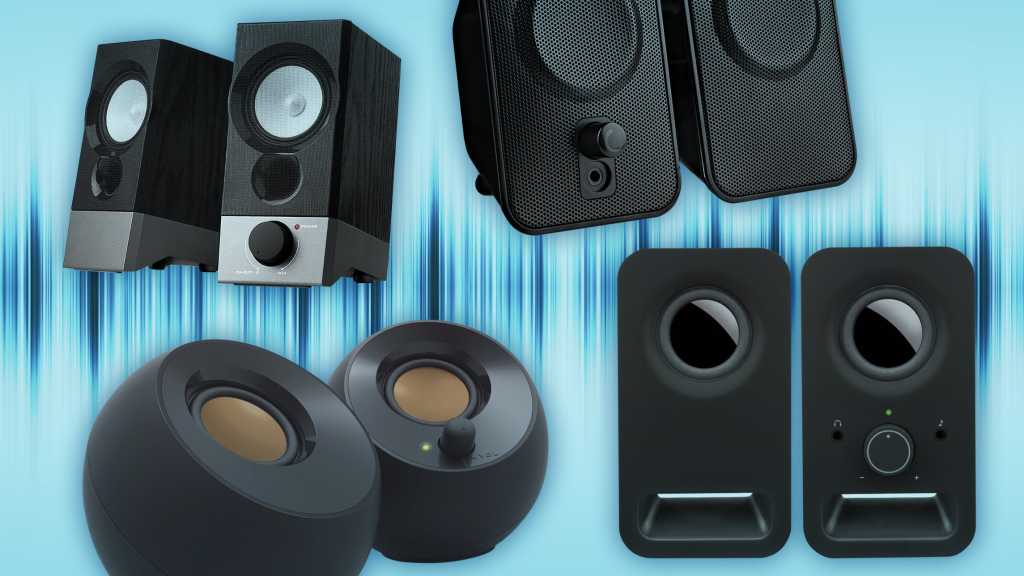Sometimes you just want to relax and hear your music or movie’s audio without being encumbered by wearing headphones. That’s especially the case if you’re enjoying your media with friends or family. The problem is that laptop speakers just often don’t have great sound; they can sound muffled, tinny, and/or lack audio fidelity. What you need instead is a good pair of PC speakers to get the best sound from your media files.
Luckily, you don’t need to buy a complete 7.1 surround sound system to feel satisfied. For less than $100, you can find some affordable PC speakers that provide quality audio. It’s true that at this price point you will need to make a few compromises, but the best budget computer speakers can still offer a quality listening experience while saving you money, and that’s what we call a win-win.
Why should you trust us? Because our PC speaker reviewers have tried most of the budget speaker models on the market, so they know the ones that stand out from those that don’t quite hit the mark. Our testing criteria is also as thorough as it gets. To test each speaker, we set it up in a typical environment — on a desk in a home office — and play a variety of audio tracks while pushing a speaker system’s sound capabilities to the limit. We consider everything from how practical the design is, to the audio fidelity. We also compare and contrast models to make recommendations based on our findings.
To get insight into our extensive testing process, you can read our article “How we test PC Speakers at PCWorld.”
Creative Pebble – Best overall budget speakers
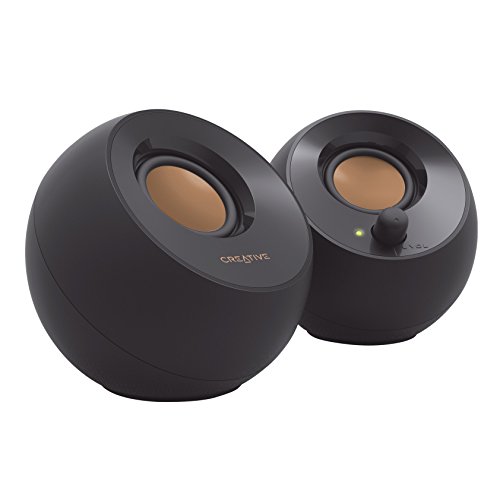
Pros
- Extremely affordable
- Excellent audio quality
- Space-saving design
Cons
- No Bluetooth connectivity for mobile devices
Why we like the Creative Pebble
We wouldn’t have thought a set of $20 speakers could impress us much, let alone turn out to be our favorite. But Creative Pebble’s simple USB-powered 2.0 system defies all odds, producing richer, more immersive audio than you commonly find in speakers at twice the price — and twice the size. Though we wish these offered Bluetooth connectivity for mobile devices, the Pebble is still a top-notch choice.
Who should buy the Creative Pebble
If you’re strapped for cash and still want decent audio, then the Creative Pebble is a no-brainer. You just need to have a USB-A port and a 3.5mm audio jack handy in your PC. You’ll also need to be cool with the fact that your speakers will be tethered, so you’ll need to unplug them if you want to move your rig.
Sound BlasterX Kratos S3 – Best budget 2.1 system
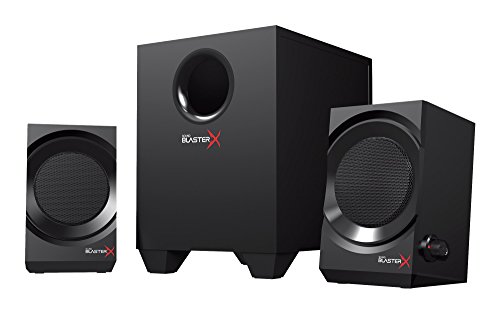
Pros
- Wooden construction enables natural, warm sound
- Small footprint
- Deep, rich bass
Cons
- No extra audio inputs for mobile devices
Why we like the Sound BlasterX Kratos S3
Though the Sound BlasterX Kratos S3 is marketed for gaming, we like how its wooden construction enables warm, natural sound and beefy bass for all of our media. At just $80 it’s an inexpensive entry point into 2.1 speaker systems, without taking much space at all.
Who should buy the Sound BlasterX Kratos S3
If you like a warm, resonant sound and punchy bass in your games or other media — the kind of sound you often get with a larger 5.1 multi-channel system — but have limited space, then the Sound BlasterX Kratos S3 will suit you to a tee.
Creative Pebble Pro – Best speakers for multiple devices
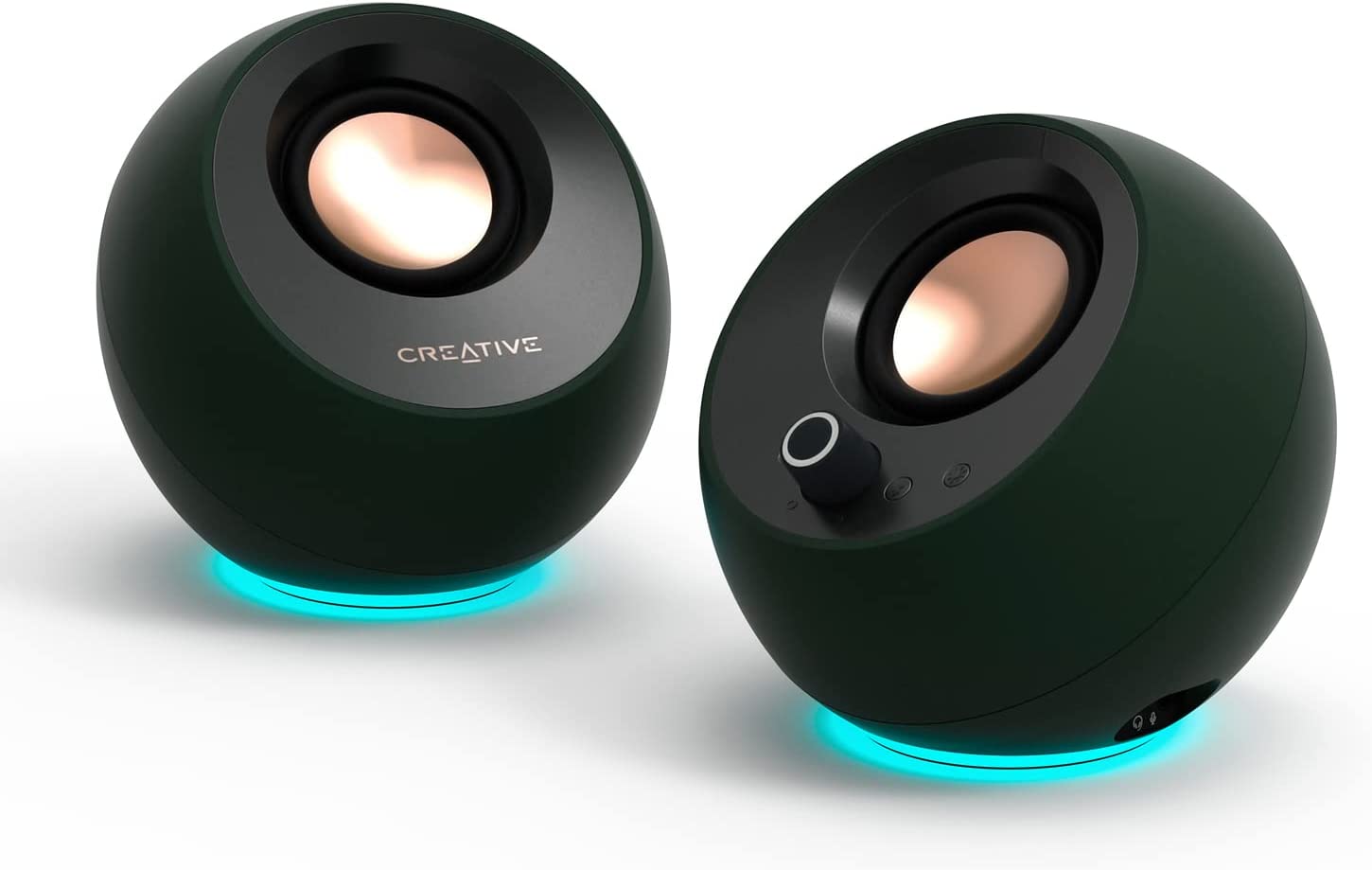
Pros
- Clear, detailed audio
- Can get very loud
- No distortion at high volume
- Noise cancellation through Creative’s software
Cons
- Volume adjustments are more minimal at higher volumes
Why we like the Creative Pebble Pro
Imagine our top overall pick, and then soup it up with more features — namely, much more connectivity and sweet RGB lighting. If you have multiple devices (plus a headset and microphone), these speakers let you centralize everything. You can connect devices via USB, a 3.5mm aux cable, and Bluetooth, and there are jacks for a 3.5mm headset and a dedicated 3.5mm microphone, too. It’s a great upgrade option if you want the Pebble’s great sound but want just one set of speakers for your gear.
Who should buy the Creative Pebble Pro
Anyone who wants the versatility of being able to use their speakers with more than just their PC — so a smartphone, tablet, or other device. These speakers are also ideal if you use a 3.5mm microphone and like the idea of using the Creative Pebble Pro’s software to do things like muting or unmuting your calls or filtering out unwanted noise.
Monoprice DT-3BT – Best premium Bluetooth option
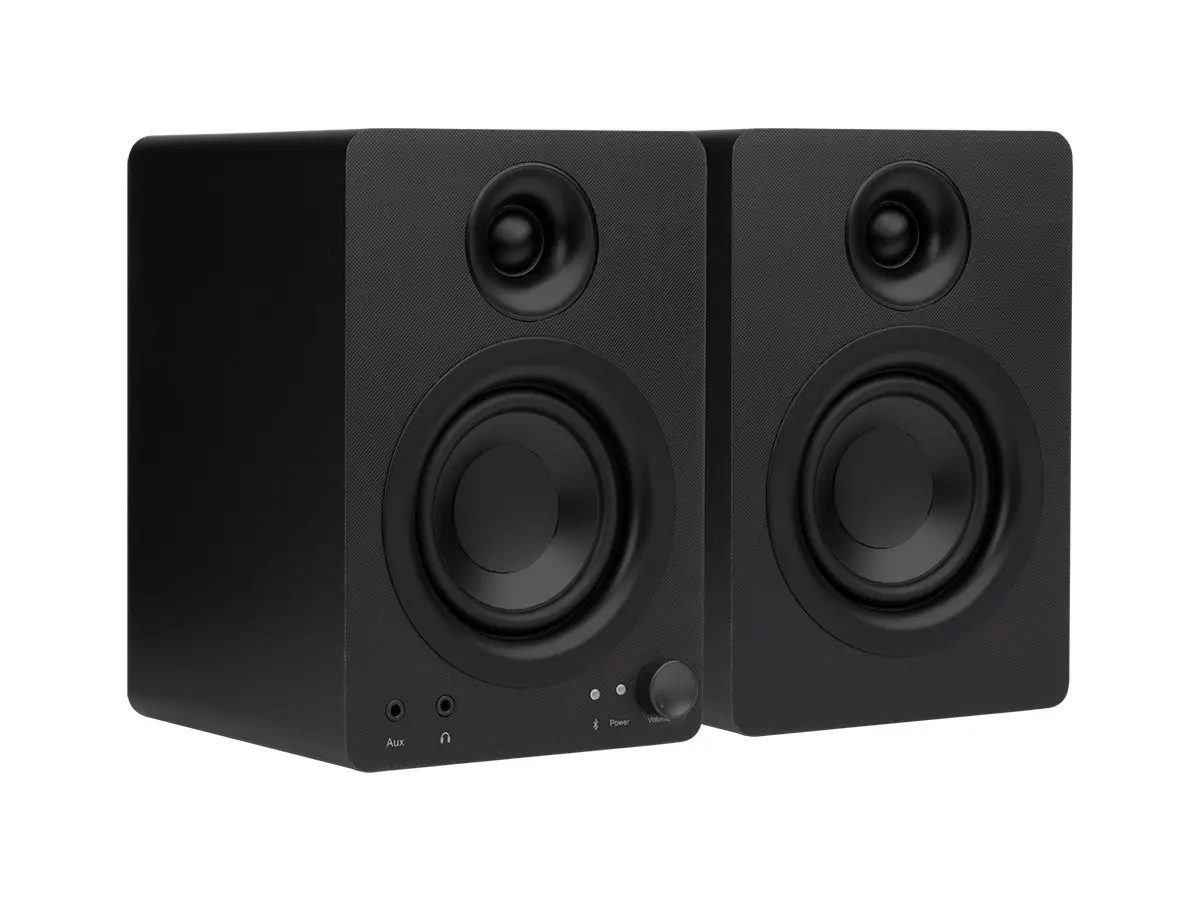
Pros
- Clean audio
- TRS, RCA, and Bluetooth connectivity
- Capable of very loud volume
- Easy access to aux input and headset output jacks
Cons
- Audio will sound a little hollow to some ears
- Audio distortion at higher volumes
Why we like the Monoprice DT-3BT
For years, Monoprice has sold affordable, quality tech gear without fanfare or frills. It continues this tradition with its 50-watt DT-3BT desktop speakers, which sport clear audio and support the most common kinds of connections. There’s of course Bluetooth 5.0 for clean, wire-free setups, but TRS and RCA jacks are available, too. Combined with the understated appearance and tidy $100 price tag, they’re an excellent option for speakers with good sound and simple setup straight out of the box.
Who should buy the Monoprice DT-3BT
If you like to hear layered elements in your music, then you’ll really like the Monoprice DT-3BT’s emphasis on higher and lower tones. These speakers also project sound very well, so choose them if you like to fill up your living room with the sound of your tunes or media.
Logitech Z207 2.0 Stereo Computer Speakers – Best multi-source option
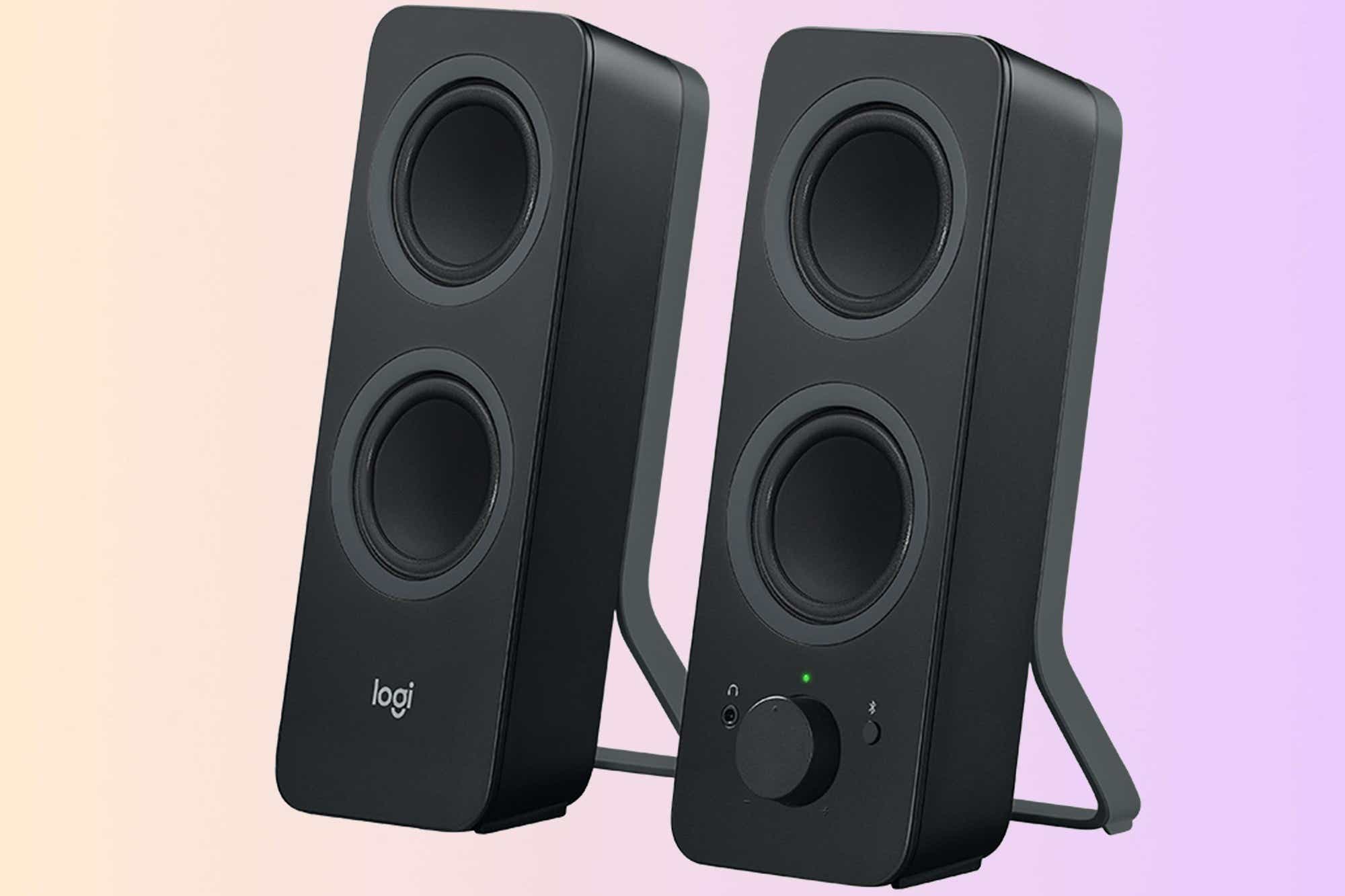
Pros
- Impressive audio quality
- Allows you to switch between three connected devices
- Easy setup and operation
Cons
- Larger than many other desktop speakers
- No audio controls other than volume
Why we like the Logitech Z207 2.0 Stereo Computer Speakers
These speakers support both a wired connection via a 3.5mm audio jack and wireless connections via Bluetooth. They produce an impressive sound that’s clear and defined, with a surprisingly impressive bass considering they don’t have a subwoofer. At 9.5 x 3.5 x 4.9 inches (HWD), they’re on the larger size, and thus aren’t the most discreet speakers, but they deliver good performance.
Who should buy the Logitech Z207 2.0 Stereo Computer Speakers
The best feature of the Logitech Z207 2.0 Stereo Computer Speakers is that they can support three simultaneous connections at once. So, if you’re a multi-device user and like the idea of switching between different audio sources, these speakers are ideal.
Cyber Acoustics CA-2890 Speaker Bar – Best space-saving option

Pros
- Clip mount keeps it off your desk
- Clear, distortion-free audio
- Can get very loud
Cons
- No bass
- Weak stereo audio
Why we like the Cyber Acoustics CA-2890 Speaker Bar
This basic speaker bar may be outclassed by other extremely affordable rivals in some ways, but it has a feature that keeps it in the running — you can clip it to a monitor. That gets this speaker off your desk, a plus for anyone that loves minimalism. Add in clear audio reproduction, and lack of distortion at high volume, and those seeking a good compact option can forgive it for its lack of bass and proper stereo output.
Who should buy the Cyber Acoustics CA-2890 Speaker Bar
Anyone super tight for desk space or who just likes a clean, uncluttered place to plant their PC. If that’s you, then you’ll love the speaker’s clip-on functionality that will win you back some much-needed real estate.
AmazonBasics USB-Powered Computer Speakers with Dynamic Sound – Best dirt-cheap option
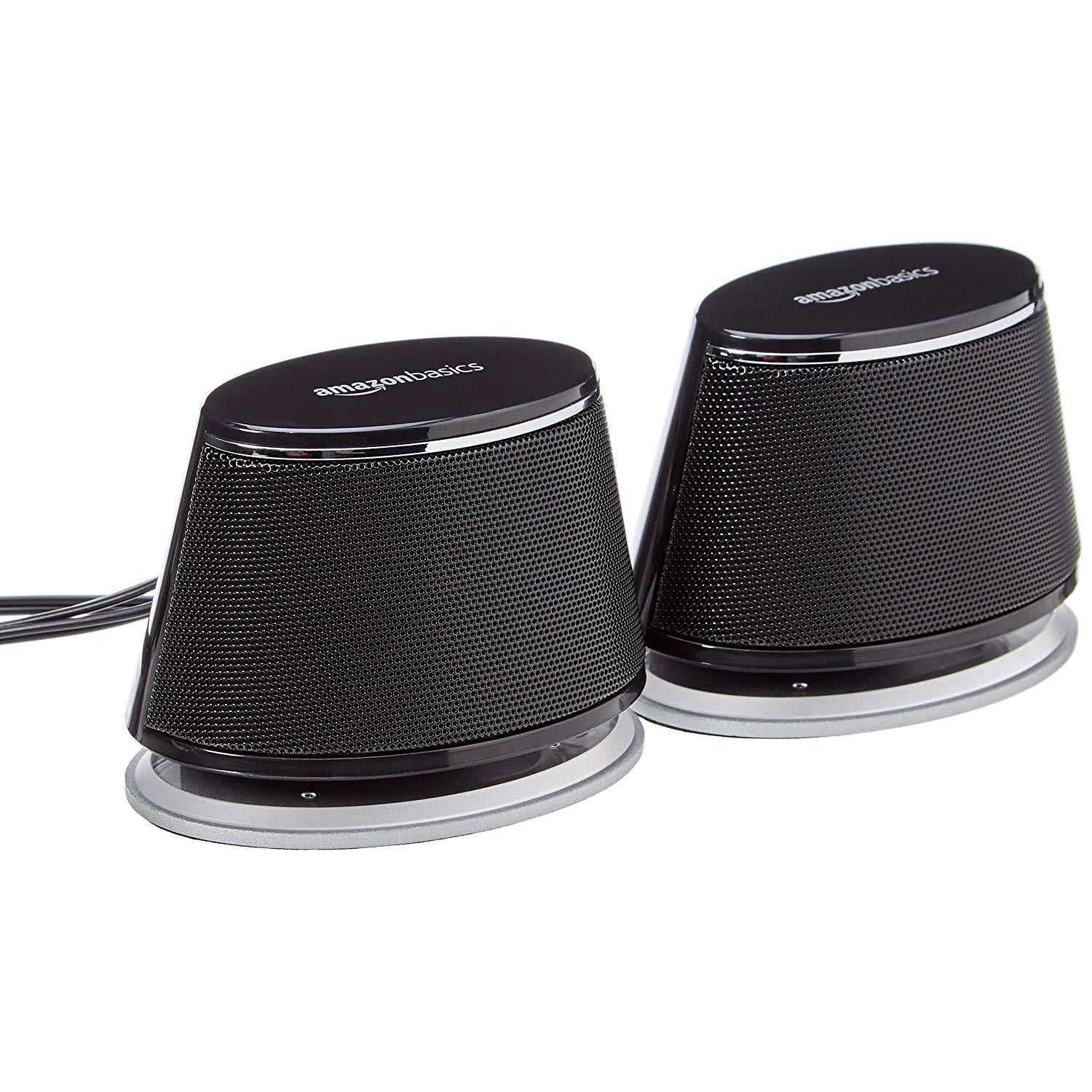
Pros
- Well-rounded sound
- Plug-and-play setup
- Low price
Cons
- Can’t turn off accent lighting
Why we like the AmazonBasics USB-Powered Computer Speakers with Dynamic Sound
These AmazonBasics USB-powered computer speakers get you well-rounded audio for a rock-bottom price. They’re easy to use with simple plug and play USB connectivity. They also feature attractive glowing blue LED accent lights below each speaker’s bottom radiator.
Who should buy the AmazonBasics USB-Powered Computer Speakers with Dynamic Sound
If your budget consists of just loose change and your goal is simply to release the sound from your PC without it sounding terrible, then these speakers will do nicely.
Creative Pebble X Plus – Best for less than $150
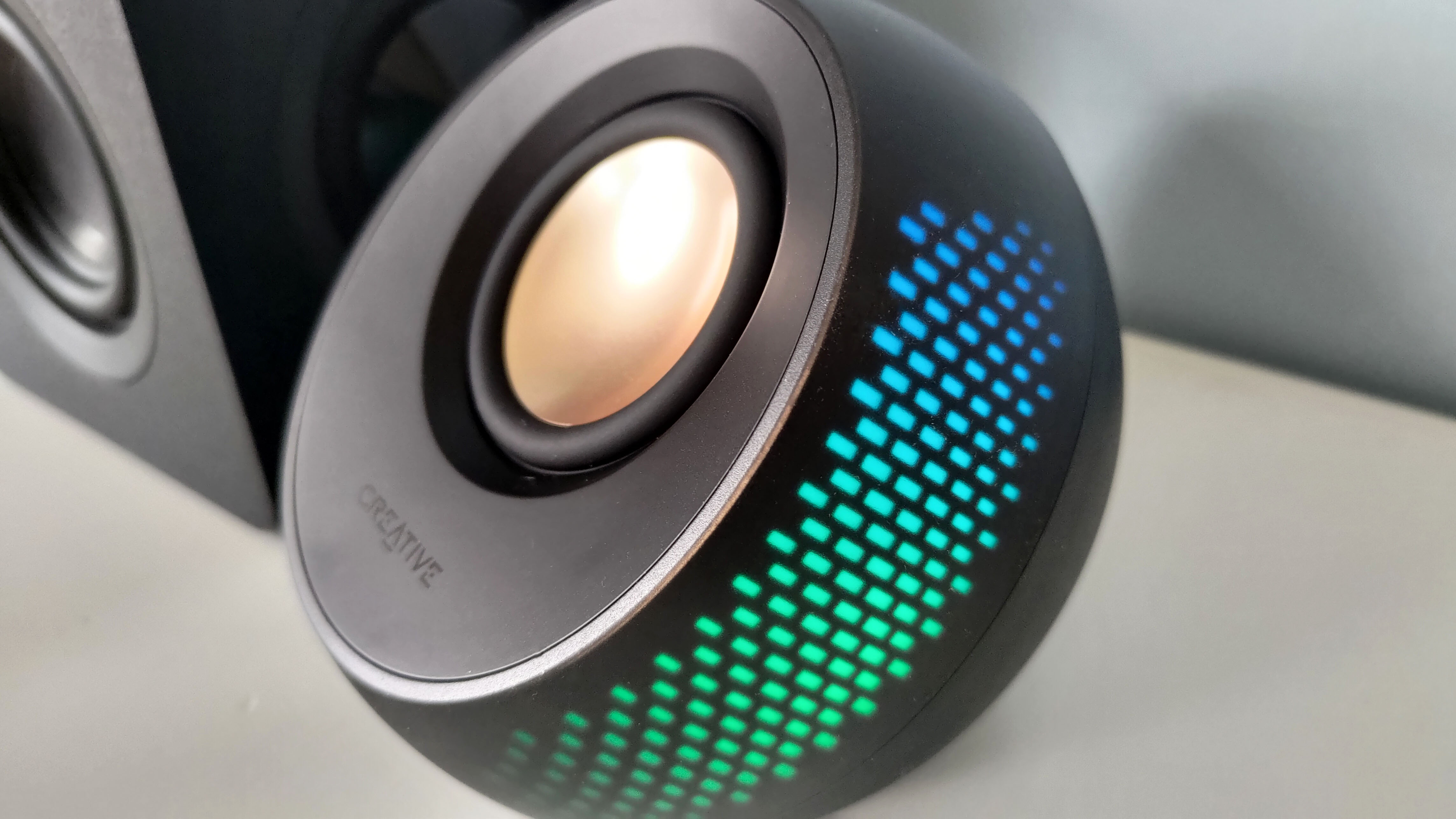
Pros
- Compact design
- Good sound quality for the money
- RGB effects, if interested
- Support for many audio sources
Cons
- Fixed, short cables
- Limited control from mobile
- No software for Mac
Why we like the Creative Pebble X Plus
With USB, Bluetooth, and 3.5mm auxiliary input, the Creative Pebble X Plus offers more than just plug-and-play speaker functionality. Indeed, you can connect it up wirelessly to your phone or wire it up to create a complete audio solution for your bedroom, dorm room, or home office. Two speakers and a woofer draw a peak 60 watts of power to comfortably fill a room with sound. They produce a clear soundstage with good level of detail in the mids and treble range. A plastic film under the woofer was a small quirk that softened the bass in our playtesting, but removing it fixed that issue.
The device makes a stylish presence on a desktop or near a PC. The two speakers, which are shaped like spheres measure a compact 5.48 inches, while the cube-shaped woofer is only slightly larger at 6.24 inches. The speakers also sport RGB lighting, which you can personalize in Creative’s companion app.
Who should buy the Creative Pebble X Plus
Anyone who wants a complete audio solution for their bedroom, dorm room or home office. These speakers may be compact, but they sound great, feature both wired and wireless connectivity options, and are also powerful enough to fill up a room. Plus, the RGB lighting will liven up your personal space.
FAQ
What type of speaker should I get? Ex: Should I aim for a 5.1 setup? And are 2.1 speakers better than 2.0 speakers?
In this price range, a 5.1 multi-channel speaker setup (five speakers, one subwoofer) won’t sound as good as better models. The same amount of money can buy a much better-quality two-speaker system. These basic 2.0 stereo setups, which are comprised of just a left and right speaker with a single driver (the actual loudspeaker) in each, abound in this price range. Occasionally you can also find a decent 2.1 system — a pair of speakers to handle the higher frequencies and separate subwoofer for the bass — for not much more. These take up extra space but often produce more balanced sound.
How do I pick a speaker that sounds good?
Don’t lean too heavily on manufacturers’ specs when making a decision. Even if you can parse frequency response numbers, they are often exaggerated. Let your ears be your guide instead. Listen for a good balance between the high (treble), mid, and low (bass) frequencies. Often, speakers will exaggerate one — usually the treble or the bass — at the expense of the others. Good speakers will produce full, detailed audio that sounds as the creator intended it.
Be aware, though, that finding strong bass response in this price range can be challenging. Without a subwoofer, 2.0 systems have trouble reproducing low frequencies. The manufacturers often use technological tweaks to amplify the bass notes, but these can sound boomy, and distort the overall mix. If a deep, controlled bottom end is a priority, a 2.1 system might be a better investment.
Should I get speakers that use AC power? Or is a set that uses USB power okay?
Both these options are prevalent in the sub-$100 price range. USB-powered speakers reduce cord clutter, as they don’t need a separate power cable. However, they can’t supply as much juice as the AC variety, so they tend to produce lower volume and less bass.
How important is a speaker’s design?
You wouldn’t think it could matter much, but even among budget PC speakers, design can play a big part in how your speaker sounds and how easy it is to use. For example, PC speakers that fire downwards instead of upwards may produce muffled sound, since the sound will have to bounce off an extra surface before reaching your ears.
Design can also play a big part determining things like how portable your speaker is. For example, wired speakers aren’t as easy to use on the go as those with Bluetooth connectivity, and small portable speakers are preferable over big cumbersome ones if you need to move them from location to location.
